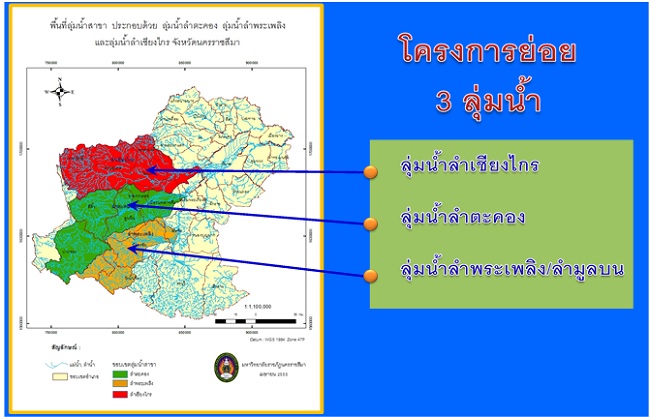THE PROMOTION OF COMMUNITY POTENTIAL DEVELOPMENT IN CONFLICT RESOLUTION MANAGEMENT OF NATURAL RESOURCES AND ENVIRONMENT, NAKHON RATCHASIMA PROVINCE
DOI:
https://doi.org/10.14456/nrru-rdi.2021.70Keywords:
Community potential development, Watershed learning center, Natural resources and environment, Level of success of the CIPP model projectAbstract
Developing community potential in managing natural resources and environmental conflicts in Nakhon Ratchasima Province was studied from a participatory action research perspective in this project. Its purpose was to synthesize conflict issues, evaluate the projects under the Royal Patronage of His Majesty the King and present a model learning center. Two non-probability, purposive sampling groups were identified, consisting of 660 participants and 150 stakeholders by using CIPP Model Project. The research instruments were an estimation scale problem severity questionnaire and a structured interview whose questions were checked by experts. Data were collected by coordinating local communities in the field, distributing questionnaires, and coordinating public forums. Groups were also organized to brainstorm opinions and needs that were presented to the meeting. Together with observation and recording, the questionnaire data were analyzed by using basic statistics, such as amount and percentage, project evaluation data by using the indicators as the mean and information from meetings and public forums for the content as the key points. The results showed that the problems of community economic development were at a moderate level, while community health and natural resources and environment was at a low level. The project found that Lam Chiang Krai watershed area process had the highest level, while Lam Ta Khong watershed area and Lam Mun-Lam-Phra Ploeng watershed areas had achieved their context at a very good level and had undertaken to establish a model learning center in 12 projects.
References
Bua-in, N., Sutham, P., & Rattanpun, S. (2016). The Development of Potential Community by the Community Master Plan of Ban Chay Wat, Sawiat Subdistrict, The Chang District, Surat Thani Province. Suratthani Rajabhat Journal, 3(2), 193-212. (In Thai)
Follett, M. P. (1927). Dynamic administration. New York : Harper & Brothers.
Government Gazette. (2018). Water Resources Master Management Plan 20 years, B. E. 2561-2580. Retrieved September 2, 2019, from https://wr.pwa.co.th/data/_uploaded/file/Law/MasterPlan 20years_2561to2580.pdf (In Thai)
Greenberg, J., & Baron, R. A. (2003). Behavior in Organizations: Understanding and Managing the Human Side of Work (8th ed.). NJ : Prentice Hall.
Khemklad, C., & Phuangngam, K. (2004). Applied Participatory Action Research. Bangkok : Sama-Thom. (In Thai)
Khuwaranyu Thiangkamon, N. (2008). Kan-Borihan-Chatkan-Singwaetlom-Lae-Sapphayakonthammachat Yang-Yang-Yuen. Retrieved October 1, 2015, from http://ebook.msu.ac.th/ebook/pdf/ 060717045536.pdf (In Thai)
Leung, K., & Tjosvold, D. (1998). Conflict Management in the Asia Pacific: Assumptions and Approaches in Diverse Cultures. Singapore : John Wieley & Sons.
Ministry of Social Development and Human Security. (2011). Strategy of the Ministry of Social Development and Human Security B. E. 2559-2559. Bangkok : Office of the Permanent Secretary, Ministry of Social Development and Human Security.
Moorhead, G., & Griffin, R. W. (2001). Organizational Behavior, Managing people and Organization (5th ed.). U.S.A. : Houghton Mifflin Company.
Nelson, D. L., & Quick, J. C. (1997). Organizational Behavior : Foundations, Realities, and Changes. St. Paul, MN : West.
Office of Natural Resources and Environmental Policy and Planning. (2012). Environmental Quality Management Plan 2012-2016. Bangkok : Rong-Phim-Dokbia. (In Thai)
Pengsawat, W. (2008). Research methodology. Bangkok : Suwiriyasan. (In Thai)
Phalivong, S. (2013). People’s Participation of Dust Paoblem Management in Vientiane Municipality Area. Thesis, Master of Arts Program in Man and Environment Management, Changmai University, Chang Mai. (In Thai)
Saksung, A., Sittichok, T., Natee, W., Lapi-e, A., Pawajitranontra, S., O-satarn, A., & Tumsuwan, P. (2018). Project Evaluation of the “3 Million People, 3 Years for Stop smoking Therdthai King” Policy : A case study of Songkhla and Satun Province. Report Report. Thai Health Promotion Foundation (Thai Health), Tobacco Control Research and Knowledge Management Center (TRC), Bangkok. (In Thai)
Sanyawiwat, S. (2007). Sociological Theory Basic content and guidelines for utilization. Bangkok : Chulalongkorn University Press. (In Thai)
Sinthonko, A. (2017). Solving Environmental Problems of Local Administrative Organizations : A Case Study of Gateway City Industrial Estate Chachoengsao province. Community Research Report. Research and Development Office King Prajadhipok’s Insititute, Bangkok. (In Thai)
Srisa-ard, B. (2013). Preliminary research (9th ed.). Bangkok : Suwiriyasan. (In Thai)
Stufflebeam, D. L., & Shinkfield, A. J. (2007). Evaluation Theory, Models, & Application. San Francisco : John Wilwy.
Suanthong, P. (2017). Concepts and Theories to Study Natural Research and Environment Management : On the View of Political Economic. Journal of Political Economy, 5(2), 95-118. (In Thai)
Sukhothaithammathirat Open University. (2014). Project Analysis and Plans Units 9-15. Bangkok : Sukhothaithammathirat Open University. (In Thai)
Thailand Environment Institute. (2013). Sammana-Wichakan-20-Pi-TEI-Kap-Thotsawat-Khangna. Nonthaburi : Ma-Ta-Kan-Phim. (In Thai)
Wasi, P. (2011). Community health system development : Community wellness is the foundation of all wellness. In the 1st forum for community health system development (pp. 3-8). Bangkok : P.A. Living. (In Thai)
Yothachan, P. (2019). Legel Measures to Promote Industrial Factory’s Participation in Natural Resources and environment Conservation. Journal of Research and Development Institute, Rajabhat Maha Sarakham University, 6(2), 357-380. (In Thai)





